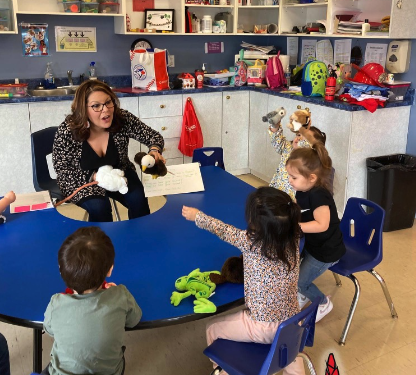
Project INSIGHTS Report
Building capacity in Indigenous early childhood education
Inclusive Economy, Quality of Work
Executive Summary
Early childhood education is a critical window of opportunity for childhood development and to disrupt pathways that can lead to poor health and education outcomes later in life, particularly in groups such as Indigenous peoples, who are disproportionately burdened by poor social determinants of health. Yet, Canada’s early childhood education system is marked by low work quality and chronic understaffing. Supporting Indigenous communities to be engaged in the care and education of their children is a critical step towards reconciliation. The Indigenous Early Childhood Education system for the Mi’kmaq northern communities of New Brunswick sought a user-centric approach to exploring new approaches to building capacity.
The project explores how Indigenous communities can be engaged in the care and education of their children and how they might advocate for better and more equitable services and programing.
When this Indigenous community was given the opportunity to engage in the education of their children, it was able to propose solutions appropriate to their particular experience.
This included improved pay, more training, expanding training and increased investment in Indigenous-centred approaches to delivering early childhood education.
contributor
Christian Noumi,
Research and Evaluation Associate at FSC
date published
May 2023
Partners
North Shore MicMac District Council
Locations
New Brunswick
investment
$130,000
Final Evaluation Report:
Minimizing the Gap in Indigenous Early Years Education

Key Insight #1
There is a $3,953 funding gap per child between programs and services available to Indigenous children on reserve in New Brunswick’s North Shore communities compared to non-Indigenous peers nearby.
Key Insight #2
More supportive work environments are needed to recruit and retain Indigenous early childhood education workers, and could include empowerment-oriented management practices.
Key Insight #3
Professional development is crucial and could include trauma-informed education, self-care for workers, art therapy, behavioural training for autism, and outdoor/land-based cultural training.

 The Issue
The Issue
This project seeks an approach to understanding and seeking solutions to the gaps in Indigenous early childhood education and that for non-Indigenous populations. It is also testing an approach that engages the Indigenous community in the education of their children. The participatory engagement process was viewed not just as a way of doing research, but as a forum for advocacy and community organizing that could be applied in other areas of research into the skills ecosystem.
- What are the perspectives of key stakeholders in the communities being served on the challenges facing the early childhood education workforce in the northern communities of New Brunswick?
- Can knowledge gained be used to advocate at regional and national tables for better and more equitable services and programing?
- What role can Elders play as a key stakeholder in early childhood education?
- Are there interventions such as supportive work environments and investment professional development that will improve recruitment and retention of Indigenous early childhood education workers?
- Would the sector benefit from a regionalized, sectoral approach to addressing shortages?

 What We’re Investigating
What We’re Investigating
This project is exploring new approaches and solutions to building capacity in Indigenous early childhood education, which much like the sector across Canada has a shortage of workers resulting from low quality of work.
The project explores how Indigenous communities can be engaged in the care and education of their children and advocacy for better and more equitable services and programing.
The goal was to surface community-identified solutions through participatory engagement.
- What are the experiences and needs of North Shore community members regarding shortages of trained Indigenous Early Learning Childhood Educators?
- What strategies does the community recommend for solving the problem of recruitment and retention of early childhood education workers in Indigenous communities?
- Can a user-centric approach with participatory engagement surface community identified solutions for collective impact?
 What We’re Learning
What We’re Learning
The participatory consultation with community members provided several key lessons for addressing challenges in early learning and education.
Elders from Indigenous communities have a role to play in early childhood education. Elders articulated a vision for early childhood education in their communities where educational programing is decoded and decolonized, formal and informal learning is balanced in culturally appropriate ways designed by and for the community, and where Elders are involved as key stakeholders given their role in connecting past, present and future generations.
Recruitment and retention of early childhood education workers needs to be improved. North Shore community members proposed solutions such as improving pay scales, expanding training and professional development opportunities and investments in Indigenous-centred approaches to delivering early childhood education.
More supportive work environments are needed. Participants suggested exploring empowerment-oriented management practices, mental health supports, more time to complete administrative tasks, and empowering educators to make more decisions regarding their teaching and classroom style.
Professional development was a cross-cutting area of concern for participants across all domains. Participants generated a list of ideas to explore, including trauma-informed education, self care for workers, art therapy, behavioural training for autism, mental health first aid, developmental trauma and outdoor, land-based cultural training.
 Why It Matters
Why It Matters
The Indigenous Early Childhood Education system for Mi’kmaq communities of North Shore is strained by pervasive quality of work issues, worker shortages and a lack of Indigenous self-determination in the way education is delivered. In addition, there is an inequity resulting from a significant gap in funding between services available to Indigenous children on reserve in the area compared to non-Indigenous children in communities there. The Indigenous community is offering perspectives and solutions that could be relevant for other Indigenous communities facing similar challenges in early childhood development.
Quality of work issues facing Indigenous early childhood education workers in the North Shore community are similar to those identified for the early childhood education sector in the Atlantic region, suggesting potential relevance of a regional sectoral approach to addressing shortages.
There is an ongoing need for investment in Indigenous early childhood education, and funding parity with programs available to non-Indigenous children. Indigenous peoples in Canada are disproportionately burdened by poor socially determined health and education outcomes. One such determinant is the legacy of residential schools, which looms over the relationship of Indigenous communities to the education system today.
Early childhood development is a critical window of opportunity in which to disrupt some of the causal pathways that can give rise to poor health and education outcomes later in life. However, the early childhood education system across Canada is caught in a cycle whereby low work quality has resulted in chronic under-staffing. The costs of this cycle are borne not only by early childhood education workers, but also by children and their families. Supporting Indigenous communities to be engaged in the care and education of their children is a critical step toward reconciliation, as set out in the Truth and Reconciliation Commission’s calls to action.
Results could provide insights into barriers in other sectors of the labour market in which the Indigenous community is involved. It could also provide solutions to addressing challenges such as low quality of work overall in the early childhood education sector.
 What’s Next
What’s Next
Insights gleaned from this project suggest a need to prioritize, implement and resource participants’ ideas for improvement in the Indigenous early childhood education sector. Employers at the Indigenous Early Learning Childhood Education Centre have identified avenues for exploration to craft workforce policies that are more responsive to the needs of Indigenous early childhood education workers and community members.
The North Shore Micmac District Council notes it will provide ongoing support for Indigenous Early Learning Childhood Education in Mimac as it implements the recommendations and that project findings will provide the foundations for their strategic plan.
Knowledge gained will be used to advocate for better and more equitable services and programming.
HOW TO CITE THIS REPORT
Noumi, C. (2023) Project Insights Report: Building Capacity in Indigenous Early Childhood Education. Toronto: Future Skills Centre. https://fsc-ccf.ca/projects/building-capacity-in-indigenous-early-childhood-education/




